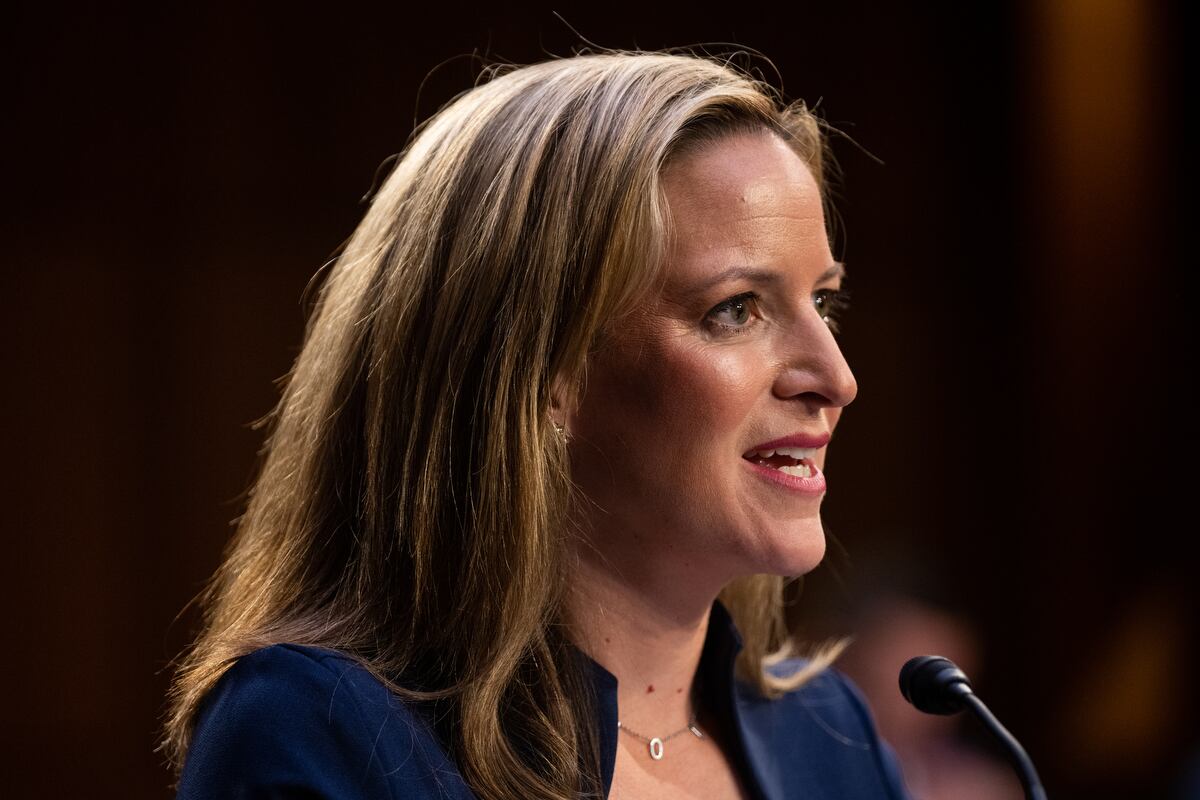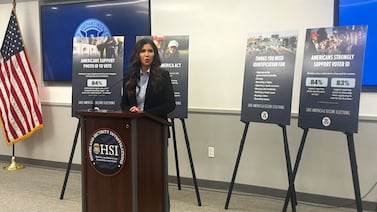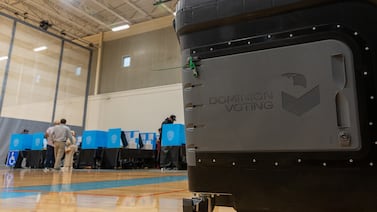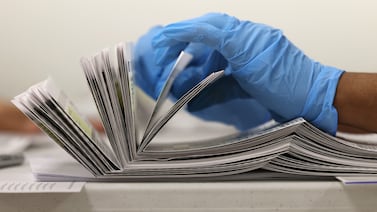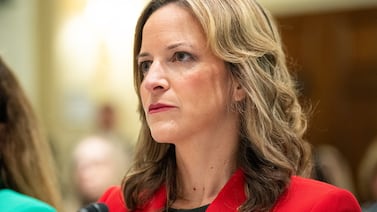Votebeat is a nonprofit news organization reporting on voting access and election administration across the U.S. A version of this post was originally distributed in Votebeat’s weekly newsletter.
Good morning,
Tinkering with election laws always seems to be in vogue.
State legislatures around the country are starting up, and lawmakers have already filed hundreds of bills that could, yet again, overhaul the running of elections. If you’re feeling deja vu, that’s not surprising. After all, just about every voter in every state has already likely experienced some kind of change in their election law since the 2020 presidential election. That’s a conclusion of the Voting Rights Lab, a nonprofit that tracks election legislation, in a report late last year.
As always, the hundreds of bills are a mixed bag. Some would institute changes that election officials have lobbied for, such as improved voter registration. But others show election conspiracy theories are still finding support among state lawmakers, even after voters around the country rejected many of the candidates most associated with them last November. In Texas and Arizona, for example, state lawmakers kicked off their sessions by providing platforms to election conspiracy theorists who made wide-ranging allegations of fraud without providing evidence, setting a tone for the sessions to come.
Trends continuing around the country include the increasing criminalization of election officials and the creation of units to investigate election-related crimes, said Liz Avore, senior adviser to the Voting Rights Lab. “These units are very expensive, seem to be entirely unnecessary, and have resulted in some cases in the harassment of voters, particularly of voters of color. So that is a concerning trend that we are seeing continuing to gain momentum and expand,” Avore said, pointing to legislation in states including Texas.
Other themes cropping up across multiple states include legislation to expand early voting in the wake of successful ballot proposals in Michigan and Connecticut, and bills that would allow online voter registration in Texas and Mississippi, she said.
Here’s what Votebeat’s reporters are watching:
ARIZONA
Arizona lawmakers kicked off their discussions about elections this week by spending hours listening to a group that has been claiming widespread voter fraud without evidence since 2020.
Giving the group, We the People, a platform at the start of the session may be symbolic for what’s to come this session. Republican state Sen. Wendy Rogers, who supports the most extreme proposals to limit voting access, controls the Senate elections committee that hosted the presentation Jan. 23, which Alex Gulotta of voting rights group All Voting is Local called a “conspiracy theory dog-and-pony show.”
Rogers will set the agenda for what changes to elections the committee will debate. That may mean a lot of time talking about extreme proposals that have no chance of becoming law under Democratic Gov. Katie Hobbs, and less time for discussion about moderate bills that actually stand a chance.
Dozens of election bills have already been filed, including everything from Republican proposals to eliminate early voting, vote centers, and drop boxes to Democratic proposals to bring back the permanent early voting list and allow independent voting in primaries.
While last year the bills that would have changed voting most drastically were blocked by moderate Republican lawmakers, this year, with Hobbs as a backstop, Gulotta said he isn’t sure moderates will see the need to push back on their own caucus as much. He expects those bills will make it all the way to a final reading and full discussion even more than last year.
“The question is how much of our time or resources will be spent entertaining radical ideas, even though they aren’t going to pass,” Gulotta said. “My thought is, probably a lot of time. We empowered radical people.” —Jen Fifield
MICHIGAN
Democrats took control of both chambers of the Legislature for the first time since 1984, which means they’re driving the legislative agenda in the closely watched political swing state.
Funding for recently approved voting reforms from Proposal 2, which includes early voting, are among the things likely to be included in this year’s session.
In addition, Democrats, including Secretary of State Jocelyn Benson, announced during a Jan. 17 news conference that they are likely to propose legislation aimed at protecting election workers from harassment, as well a measure to overhaul ballot petition signature-gathering practices in the state.
“We owe it to these guardians of democracy to ensure that they can do their work free of intimidation, free of threats and worse,” said Democratic state Rep. Kara Hope, who pledged to reintroduce legislation that aims to do just that.
Republicans, too, have priorities, though their legislation faces more uncertain prospects. Republican state Sen. Jim Runestad said he plans to introduce a bill allowing cameras inside election counting boards for “transparency” purposes. —Oralandar Brand-Williams
PENNSYLVANIA
It seems all but certain now that a constitutional amendment ballot question requiring enhanced voter ID will not get the legislative votes it needs to make it onto the ballot this spring. The state Senate packaged the amendment with one that would expand the window for sexual abuse victims to sue their abusers, in the hopes the Democrat-heavy state House would pass both together.
But the House is now out of session until late February, after special elections for vacant seats in Allegheny County are expected to put the chamber more firmly in Democratic hands. The amendment technically only needs to pass through the House any time before the session ends in 2024 in order to be placed on the ballot, but that is unlikely to happen while Democrats control the chamber.
In the meantime, there are no shortage of election administration proposals being put forward in cosponsorship memos — everything from moving back the state’s primary date to forcing politicians to clean up their yard signs and billboards after an election. But lawmakers and outside observers who have spoken with Votebeat agree the most likely scenario would be a legislative deal trading voter ID legislation for a longer mail-ballot pre-canvassing period, both considered low-hanging fruit with some bipartisan support.
A caveat: Any bill on elections will eventually have to pass through state Sen. Cris Dush, a Republican who chaired an inquiry into disproven claims of fraud in the 2020 election. Progressives worry he could be a bottleneck to reform. —Carter Walker
TEXAS
Two weeks into the legislative session, the number of bills that would affect elections is up to nearly 100, and there are more on the way. It’s likely that will include legislation spurred by voter fraud activists’ conspiracy theories: Even though there’s still no evidence in Texas or anywhere of widespread voter fraud, some Texas legislators are listening.
On Tuesday, TexasFirst.org, a right-wing election activist organization hosted an hours-long “election legislative briefing” at the Texas Capitol where “the lack of accuracy, transparency and accountability in the current Texas election process” was discussed. Speakers included Republican Sen. Bob Hall, Texas GOP Vice Chair Dana Myers, and Russ Ramsland, a Texas-based Republican businessman also known for spreading election conspiracy theories. The event was live streamed and promoted online by The America Project – an organization led by former President Donald Trump allies Michael Flynn and former Overstock CEO Patrick Byrne, both well known for spreading election fraud conspiracy theories.
At the event, Hall described a “framework” for the type of election-related legislation he plans to file during this session.
Hall’s proposed legislative items echo misinformation spread by local and national groups that have seeded doubts about the outcome of the 2020 presidential election. Hall plans to file legislation to ensure paper ballots are numbered sequentially. He is also planning legislation to get rid of electronic voting machines and electronic poll books — the system used by election officials to keep an electronic list of registered voters for an election — and to instead have paper poll books only. Finally, he wants to eliminate voting centers and go back to precincts. It isn’t clear that any of those ideas have enough support to pass.
Across the aisle, some Democrats have been making moves to expand voting access and to expand protections for election administrators, though, as the minority party, their bills have a narrower path. Sen. Nathan Johnson filed a bill that would make harassment of election officials a state jail felony. And, in reaction to Votebeat’s reporting that Attorney General Ken Paxton had released a legal opinion that would allow anyone to access voted ballots right after an election — which isn’t based on any changes to the law — Johnson filed a bill that would help confirm the 22-month preservation period of the documents. The bill aims to help clarify conflicting directions election officials have received from Paxton, which puts them at risk of potential criminal penalties and more lawsuits. —Natalia Contreras
Back Then
Listen, the legislative session is gonna be spicy — but, like, a 2 on that scale they give you at Thai restaurants. Consider this: In 1842, a militant suffrage party made up of mechanics and laborers wrote a new constitution in Rhode Island and got it passed in a referendum. It opened voting up to all white males, when before, only wealthy white men could vote. But it received immediate criticism from abolitionists and the existing government. Soon, Alexander Keyssar writes, “supporters and opponents of suffrage expansion denounced one another in street confrontations, in pamphlet wars, speaking tours, and rhetorical appeals to the federal government.” Reformers held elections under the newly ratified constitution, electing a fellow reformer as governor, while the existing government passed laws imposing life imprisonment, along with the accompanying charge of treason, for those who participated in “unauthorized elections.” After months of additional skirmishes — including the reformers attacking the state arsenal only to see their cannons misfire — the reformers were effectively splintered, and mostly retreated.
New From Votebeat
At least three Texas counties — Tarrant, Williamson, and Harris — have sued Attorney General Ken Paxton and are asking a judge to strike down a legal opinion he released last year that says anyone can access voted ballots right after an election. The lawsuits allege Paxton’s opinion violates state and federal law, contradicts his own previous direction on the issue, and exposes local election administrators to potential criminal charges, Natalia Contreras reports for Votebeat Texas.
During last fall’s fights in Cochise County over hand-counting ballots and rejecting the election results, county residents say they were glad Elections Director Lisa Marra was standing up to defend elections. Now Marra is leaving her post. Her departure after five years running elections in the rural southern Arizona county leaves many residents there concerned about the accuracy and security of future elections, Jen Fifield reports for Votebeat Arizona.
Votebeat Pennsylvania reporter Carter Walker started his job nearly on the eve of the Nov. 8 election and has barely stopped to catch his breath since. But once Pennsylvania belatedly certified its election results, he paused to write the traditional Votebeat personal essay about his interest in local election coverage and why he joined this news organization. Read it here.
In Other Voting News
- Former President Donald Trump received “direct updates” on the progress of the Arizona Senate’s review of Maricopa County’s 2020 ballots and Cyber Ninjas’ Doug Logan asked go-betweens to convince the former president to help pay costs, even as Senate leaders said Trump was not involved and the process was not meant for his benefit, the Arizona Republic reported, citing newly released records. In Part 2, the Republic reveals the chaotic and often dysfunctional dynamic behind the scenes among the review’s contractors.
- Meta will reinstate former President Donald Trump’s accounts on Facebook and Instagram two years after suspending him in the wake of violence in January 2021 at the U.S. Capitol, the New York Times reported. The company said Trump’s threat to public safety had receded.
- The decision by Alabama’s new secretary of state to withdraw from a multistate consortium meant to ensure the accuracy of voter rolls shows how conspiracy theories continue to shape election policy, Politico reported.
- Lawyers defending Fox News in a closely watched defamation case filed by Dominion Voting Systems are arguing that Fox was merely covering newsworthy statements by former President Donald Trump and his allies, even though the assertions were not true, NPR reported.
- Catherine Engelbrecht and Gregg Phillips, leaders of True the Vote, a conservative nonprofit that has spread conspiracy theories about elections, solicited donations to bring a mobile hospital to Ukraine to care for victims of the conflict in the region, but the hospital didn’t move forward, and Engelbrecht and Phillips say they didn’t raise substantial amounts of money, a joint investigation by ProPublica and the Dallas Morning News reported.
- State authorities in New Jersey have retained an outside law firm to investigate allegations that a voting technician’s error in Monmouth County caused some votes to be counted twice, potentially changing the outcome of a race, the New Jersey Monitor reported.

